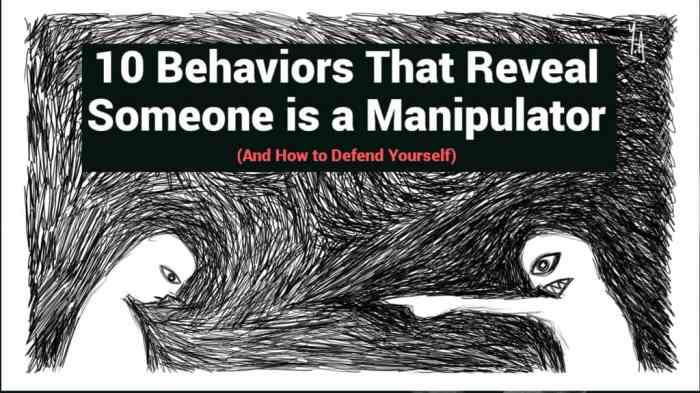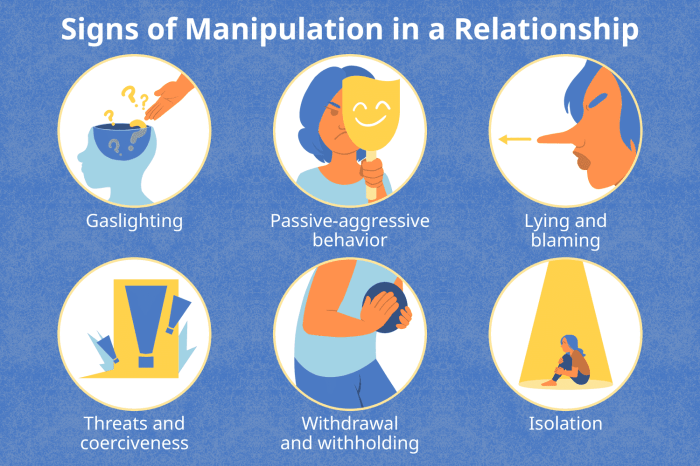Am i a manipulator quiz – Embark on an introspective journey with the “Am I a Manipulator?” quiz, a thought-provoking assessment that delves into the intricacies of human behavior. Designed to shed light on your manipulative tendencies, this quiz promises a candid exploration of your interpersonal dynamics.
Through a series of carefully crafted questions, the quiz probes your motivations, communication patterns, and emotional responses, providing valuable insights into your potential for manipulation. Whether you’re seeking self-awareness or simply curious about your manipulative tendencies, this quiz offers a unique opportunity for introspection and personal growth.
Quiz Structure
The “Am I a Manipulator?” quiz comprises a series of 10 questions designed to assess an individual’s tendencies toward manipulative behavior.
The quiz utilizes a multiple-choice format, presenting respondents with various scenarios and asking them to select the response that best aligns with their usual approach.
Scoring System
Each question carries a score ranging from 1 to 5, with higher scores indicating a greater likelihood of manipulative behavior.
Upon completing the quiz, respondents receive a total score that falls within one of three categories:
- Low (10-25 points): Indicates minimal manipulative tendencies
- Moderate (26-35 points): Suggests some manipulative behavior but not to an alarming extent
- High (36-50 points): Raises concerns about significant manipulative behavior
Question Analysis

The “Am I a Manipulator?” quiz questions delve into various aspects of manipulation, exploring the key themes of emotional control, deception, and power dynamics.
The questions are crafted to assess an individual’s tendencies toward manipulative behavior by examining their attitudes, beliefs, and patterns of interaction.
Question Wording and Intent
- Example Question:“I often use flattery to get what I want.”
- Analysis:This question probes the individual’s reliance on flattery, a common tactic used by manipulators to gain favor and influence others.
- Example Question:“I believe that it is acceptable to lie to someone if it benefits me.”
- Analysis:This question assesses the individual’s moral compass and their willingness to engage in deception, a hallmark of manipulative behavior.
- Example Question:“I am always trying to one-up others in conversations.”
- Analysis:This question examines the individual’s competitive nature and their desire for dominance, which can be a driving force behind manipulation.
Scoring and Interpretation

Your quiz responses are analyzed to determine your level of manipulation based on the frequency and intensity of manipulative behaviors you exhibit. Each question is assigned a score, and the total score is categorized into different levels of manipulation.
The quiz identifies three levels of manipulation:
Mild Manipulation, Am i a manipulator quiz
- Scores in the low range indicate that you may occasionally engage in manipulative behaviors but they are not a significant part of your personality.
- This level of manipulation is often used to achieve specific goals or navigate social situations.
- It is important to be aware of these behaviors and work on developing healthier communication and interpersonal skills.
Moderate Manipulation
- Scores in the middle range suggest that manipulation is a more frequent and intentional part of your behavior.
- You may use manipulation to gain control, avoid responsibility, or get what you want at the expense of others.
- This level of manipulation can damage relationships and hinder personal growth.
Severe Manipulation
- High scores indicate that manipulation is a deeply ingrained pattern in your behavior.
- You may be using manipulation to control and exploit others, and you may have difficulty recognizing or empathizing with their feelings.
- This level of manipulation requires significant effort to change and may involve seeking professional help.
Remember, the quiz results are a snapshot of your current behavior and do not define you. Use them as a tool for self-reflection and growth. If you identify manipulative tendencies, consider seeking support from trusted individuals, therapists, or support groups.
Ethical Considerations: Am I A Manipulator Quiz

Utilizing a quiz to evaluate manipulation inclinations raises ethical concerns that must be addressed. It is imperative to acknowledge the potential for false positives or negatives and their impact on individuals.
Informed consent is paramount. Individuals taking the quiz should be fully aware of its purpose, potential outcomes, and how their data will be used. Responsible use of the quiz dictates that it should not be employed for diagnostic purposes or to label individuals as manipulators.
You can breeze through an “Am I a Manipulator?” quiz as fast as a speeding bullet , but that doesn’t mean you’re a master manipulator. It’s crucial to assess your motives and behaviors critically to gain a genuine understanding of your intentions.
Don’t be so quick to label yourself without thorough introspection.
False Positives and Negatives
False positives occur when an individual is inaccurately identified as having manipulation tendencies. This can lead to unwarranted stigma, distrust, or even discrimination. Conversely, false negatives occur when an individual with manipulation tendencies is not identified, potentially enabling them to continue engaging in harmful behavior.
Importance of Informed Consent
Informed consent ensures that individuals understand the nature of the quiz and its implications before participating. They should be provided with clear information about the purpose of the quiz, how their data will be used, and the potential risks and benefits involved.
Comparison to Other Assessments

The “Am I a Manipulator?” quiz is a self-report assessment that provides a preliminary indication of manipulative tendencies. It differs from other methods of assessing manipulation, such as clinical interviews and personality tests, in several key aspects.
Clinical Interviews
Clinical interviews involve a trained professional conducting a structured or semi-structured conversation with the individual being assessed. These interviews allow for in-depth exploration of the individual’s thoughts, feelings, and behaviors related to manipulation. The interviewer can observe the individual’s nonverbal cues, ask clarifying questions, and probe for specific details.
Clinical interviews are generally considered to be the most comprehensive and accurate method of assessing manipulation.
Personality Tests
Personality tests, such as the Machiavellianism scale or the Dark Triad scale, measure specific personality traits that are associated with manipulative behavior. These tests typically involve a series of questions or statements that the individual responds to on a Likert scale.
Personality tests are relatively easy to administer and score, but they may be less accurate than clinical interviews due to the potential for individuals to provide socially desirable responses or to misinterpret the questions.Each approach has its own strengths and limitations.
Clinical interviews provide the most comprehensive and accurate assessment but are time-consuming and require trained professionals. Personality tests are more efficient and cost-effective but may be less accurate. The “Am I a Manipulator?” quiz falls somewhere in between, offering a preliminary screening tool that can be used to identify individuals who may benefit from further assessment.
Helpful Answers
Is the “Am I a Manipulator?” quiz reliable?
The quiz provides an initial assessment of manipulative tendencies but should not be considered a definitive diagnosis. It serves as a starting point for self-reflection and further exploration.
What if I score high on the quiz?
A high score may indicate a tendency towards manipulative behavior. It’s important to approach the results with self-awareness and a willingness to explore underlying motivations and patterns.
Can I use the quiz to manipulate others?
The quiz is designed for self-assessment and should not be used to manipulate others. It’s crucial to approach the results with integrity and a desire for personal growth.
